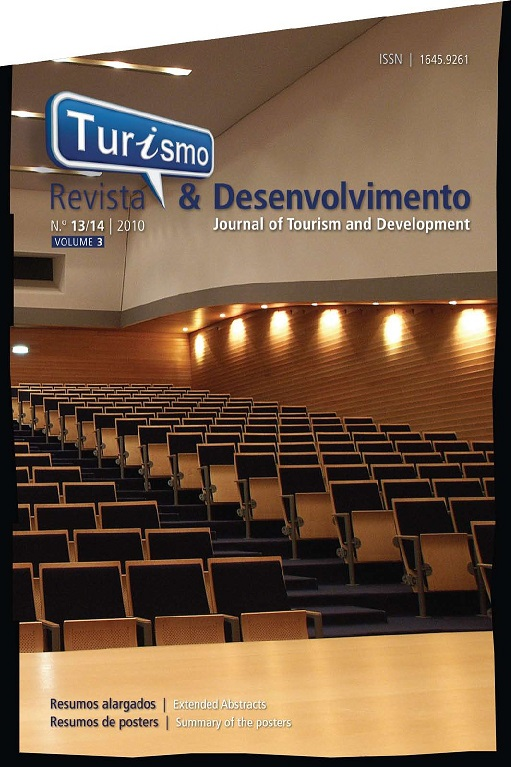Cooperation between tourism and wine SMES’: perceived advantages and disadvantages
Resumo
Objectives | Tourism has increasingly attracted the attention of many countries’ as it is widely recognized today as one of the most important and largest industries of the global economy. However, and despite its development, businesses, particularly small and medium-sized ones (SME’s), still have to face great challenges when it comes to attracting, transporting, hosting and managing tourists.According to Pesämma et al. (2007) SME’s have to face difficulties in meeting by themselves tourists’ needs and in surviving alone in an increasingly competitive business environment with rapid economic, technological, and social changes. It is still recognized by other authors such as Fyall and Garrod (2005) that if businesses are to achieve their objectives, attain a stronger position, and offer attractive and competitive products/services, they need to cooperate with each other, rather than working in isolation. Despite the interest in the literature on cooperation shown by the number of studies with a particular emphasis on its potential advantages, further research is required to understand what are those factors influencing SMEs owners/ managers’ decisions on cooperation, their perceptions about the advantages and disadvantages of cooperation in specific contexts and to understand to what extent these perceptions influence their behaviour in cooperating, or not as the case may be,with other businesses, both in the same sector and in different sectors.This is the underpinning academic rationale of the ongoing PhD study and it sets the research context supporting this paper. For the purposes of this paper, the objectives are as follows:
– Present and explain the conceptual framework;
– To discuss the adopted methodology designed to meet the research objectives, and
– To present some preliminary results of the ongoing data collection.
Methodology | This study focuses on providing both descriptions and explanations of cooperative behaviour both from two different perspectives. The first perspective focuses on the perceptions of tourism businesses cooperating with tourism and wine businesses. The second perspective focuses on the perceptions of wine businesses cooperating with wine and tourism businesses. In relation to these perspectives the descriptive approach will focus on describing the experiences of businesses in terms of cooperating. The explanatory approach will focus on why cooperation takes place or does not take place and why such cooperation is successful or not. Data in this study is being obtained through a survey that makes use of a questionnaire that is the basis of a face-to-face interview. This data collection method was adopted following the consideration of the advantages and limitations of available data collection techniques, the aims of the study, the nature of data to be collected (measurement of businesses perceptions, the behaviour towards cooperation and its influences), the characteristics of the population, and the resources available. The geographical area of the study is the Douro Region in the North of Portugal. In the Portuguese context, this region has been getting increasing attention by both businesses and Government. The region is now seen as very attractive region to invest in by some businesses, including some of the important or recognized players in the Portuguese tourism sector. Additionally the Government is now looking at the Douro as one of priority regions for tourism, according to the Tourism National Strategy, with its great potential of development and contribution to tourism development recognized. In this research, 200 businesses will be surveyed, 100 tourism businesses and 100 wine businesses. These sample sizes will allow a cross comparison of the answers for hypothesis testing purposes. The questions asked in the questionnaire focus on the different theoretical approaches and frameworks that lead to the conceptual framework, bringing together different influences on businesses’ decision whether to cooperate.The conceptual framework comprises different groups of influences that are of different importance and that may push in different directions (for and against). In order to have owners/ managers’ perceptions of those factors that might have an influence on their decision, both open and closed questions are asked. Open questions such as: what, why, with whom and how are asked to get more detailed data in own words about the factors that have influenced their decision in the past three years. On the other hand, closed questions drawn from the literature aim at understand businesses’ perceptions about the identified advantages, disadvantages and factors influencing their decision. Thus, a group of factors is presented and respondents are asked to identify the extent to which they are important in their decision in cooperating or not with other businesses in the middle-term future of their business.
Main results and contributions | Given the actual stage of the aforementioned PhD research, this paper presents and discusses the proposed conceptual framework and methodological approach. It will contribute to the debate on the topic, by explaining how it is expected to overcome some of the limitations identified in previous research in the field of cooperation research, particularly in the tourism and wine context.
Limitations | This paper is a result of an ongoing data collection and therefore its immediate shortcoming is the fact of data presented being preliminary.
Conclusions | This paper summarizes the literature discussing the influences on business decisions on cooperation, offers a discussion of why the methodological approach was adopted given the study objectives, and presents preliminary data relating to the influences on the Douro Region tourism and wine businesses’ decision, and the nature of cooperative initiatives, if they have cooperated already





